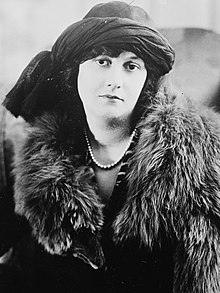Elizabeth Bibesco
British writer, and Romanian princess
Princess Elizabeth (Asquith) Bibesco (26 February 1897 – 7 April 1945) was an English writer and poet, active between 1921 and 1940. A final posthumous collection of her stories, poems and aphorisms was published under the title Haven in 1951.

Quotes
editHaven (1951)
edit- Of what help is anyone who can only be approached with the right words?
- Blessed are those who give without remembering and take without forgetting.
- Life more often teaches us how to perfect our weaknesses than how to develop our strengths.
- Those we love are entitled to resent the allowances we make for them.
- To be on a pedestal is to be in a corner.
- What we buy belongs to us only when the price is forgotten.
- It is easier to be generous than to be just.
- Each play worth seeing should be watched a second time on the faces of the audience.
- Winter draws what summer paints.
- The image of ourselves in the minds of others is the picture of a stranger we shall never see.
- We learn nothing by being right.
- We are bound to those we love by their imperfections — their perfections help us to explain them to others.
- Our losses should frequently be put on the credit side.
- To regret your sins of commission as much as your sins of omission is to prove yourself a most unworthy sinner.
- Death is part of this life and not of the next.
- Perfect moments don't turn into half-hours.
- Portrait of Caroline
- My soul has gained the freedom of the night.
- Poems (1928)
About Elizabeth Bibesco
edit- I always felt a deep malaise in her — her writing and the fluctuations of her brilliant and esoteic conversation led her everywhere but to self-satisfaction.
- Prince Antoine Bibesco, when asked (by her mother, Margot Asquith) why his wife didn't do more "good works", such as visiting a hospital, replied, "Dearest Margot, Elizabeth visits a hospital three times a week, with the result that the lame walk, the blind see, and the dumb would speak if they could get a word in edgeways."
- Anecdote about Antoine and Elizabeth Bibesco, mentioned in London's Secret History (1983) by Peter Bushell, p. 187
- Princess Bibesco delighted in a semi-ideal world — a world which, though having a counterpart in her experience, was to a great extent brought into being by her own temperament and, one might say, flair.
- A brilliant woman whose perpetual wit made my head swim.
- Miss Asquith, who was probably unsurpassed in intelligence by any of her contemporaries … looked like a lovely figure in an Italian fresco.
- She is pasty and podgy, with the eyes of a currant bun, suddenly protruding with animation.
External links
edit- Encyclopedic article on Elizabeth Bibesco on Wikipedia
- Media related to Elizabeth Bibesco on Wikimedia Commons
- Works related to Author:Elizabeth Bibesco on Wikisource
- Works by Elizabeth Bibesco at Project Gutenberg